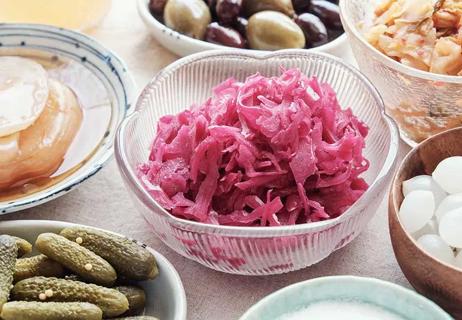Maintain a healthy vaginal microbiota with the help of good bacteria

Whether found in foods like pickles, yogurt or sauerkraut, or even as a supplement, probiotics aid in gut health. Live microorganisms, probiotics survive in your gut when ingested and provide more of the good bacteria that we naturally have.
Advertisement
Cleveland Clinic is a non-profit academic medical center. Advertising on our site helps support our mission. We do not endorse non-Cleveland Clinic products or services. Policy
But is it possible that those same probiotics can help with the health of your vagina?
The research is promising, says Ob/Gyn Oluwatosin Goje, MD.
“Many Lactobacillus strains possess probiotic properties, and several studies demonstrate the ability of Lactobacillus to adhere to vaginal and cervical epithelial cells,” explains Dr. Goje. “Numerous Lactobacillus strains have been shown to be active against the main pathogens responsible for bacterial infections of the vaginal and urinary tract.”
Some Lactobacillus strains that can help with vaginal health include:
Dr. Goje explains the research around probiotics and vaginal health.
It’s estimated that about 100 trillion microbes are found inside the human body, with many of them residing in our gut.
But there are also more than 50 different microbes that live inside of your vagina. Researchers are just beginning to study the connection between the gut microbiome and vaginal microbiome, says Dr. Goje.
“There is a possibility of ‘crosstalk’ between the gut and vagina microbiota; however, we still need more research to understand the relationship,” she continues. “The transfer of bacterial strain from the gut to the vagina has been indicated in a lab. But the question of if we can balance vaginal health via gut health is still experimental.”
Advertisement
Vaginal imbalances can lead to bacterial vaginosis and yeast infections.
These imbalances can be caused by:
Bacterial vaginosis (BV), a common vaginal infection, happens when normal bacteria that live in your vagina overgrow, causing a bacterial imbalance and changes in vaginal pH.
Symptoms may include:
In some individuals, BV goes away without treatment. But in others, antibiotics may be needed to treat this infection.
Studies show that taking probiotics like Lactobacillus crispatus may treat and even help prevent BV.
“The vaginal application of Lactobacillus crispatus after treatment of BV with a topical antibiotic decreased recurrence for three months after the last dose of the probiotic,” notes Dr. Goje.
A vaginal yeast infection is a type of vaginitis, a condition where your vagina is swollen, painful and creates a discharge. Vaginal yeast infections happen to more than 1 million individuals in the United States every year.
Symptoms may include:
A vaginal yeast infection traditionally is treated with an antifungal medication. This type of medication is specifically used to combat overgrowths of yeast in your body.
But Lactobacillus rhamnosus can also be helpful when it comes to yeast infections. The probiotic can survive acidic conditions in the human body leading to long-term benefits.
“Lactobacillus rhamnosus, the most researched probiotic, has been found to be beneficial in the prevention of yeast infection,” explains Dr. Goje. “Research shows that Lactobacillus rhamnosus kills bacteria and yeast in the vagina. It can restore the urogenital flora in individuals with a history of BV, yeast vaginitis or urinary tract infections (UTIs).”
Lactoferrin, a protein and one of the major antimicrobial components of our immune system, has been found to kill bacteria in the vagina. A combination of oral lactoferrin with or without oral or vaginal Lactobacillus may restore balance in your vagina and prevent frequent infections.
Advertisement
Different areas of the human body have their own pH balance, including your blood, skin and reproductive system.
You may have seen products claiming to help balance the pH of your vagina. So, is vaginal pH balance something you need to be concerned about?
Your vaginal pH levels play a role in preventing infections, supporting healthy pregnancies and any hormonal changes.
How acidic a substance is runs from 0 to 14. A pH of less than 7 is considered acidic, and a pH of more than 7 is basic. Maintaining a normal vaginal pH greater than 4.5 could help achieve a balanced vaginal environment and prevent recurrent BV.
Turning to probiotics may help with your vaginal pH balance.
“Probiotics, or lactobacillus found in probiotics, produce lactic acid which subsequently produces hydrogen peroxide,” says Dr. Goje. “Production of hydrogen peroxide contributes to a healthy vagina, establishing defense against pathogens.”
There are around 500 different strains of probiotics. When it comes to promoting the overall health of your vagina, you want to look for probiotics Lactobacillus crispatus and Lactobacillus rhamnosus, which have been shown in human trials to be beneficial for vaginal health.
Advertisement
“I recommend reading the labels and confirming it has Lactobacillus crispatus and or Lactobacillus rhamnosus amongst the other Lactobacillus in the probiotic,” says Dr. Goje. “Probiotics come as a combination of various Lactobacillus. Some have lactoferrin and those targeting UTI prevention may have cranberry extracts.”
While probiotics don’t have any side effects, make sure you take any supplements as directed. And if you have recurrent BV and yeast infections, even after trying medications and probiotic supplements, it’s important to see your doctor.
Advertisement
Learn more about our editorial process.
Advertisement

This fermented food can feed your gut, help manage hunger and possibly curb colon cancer risk

Yogurt, sauerkraut, kimchi and other fermented foods are a good way to get those beneficial microbes

Probiotics are ‘good’ bacteria that help your gut, while prebiotics are foods that fuel the bacteria

Taking your probiotics in the morning with food is a great strategy — but consistency is key

There’s little evidence that probiotics cause weight loss, but having a healthy gut microbiome may set the stage for it

Pay close attention to the dose, colony-forming units, storage information and genus

Chemo cold caps may help you keep more of your hair during therapy

If you’re feeling short of breath, sleep can be tough — propping yourself up or sleeping on your side may help

If you fear the unknown or find yourself needing reassurance often, you may identify with this attachment style

If you’re looking to boost your gut health, it’s better to get fiber from whole foods